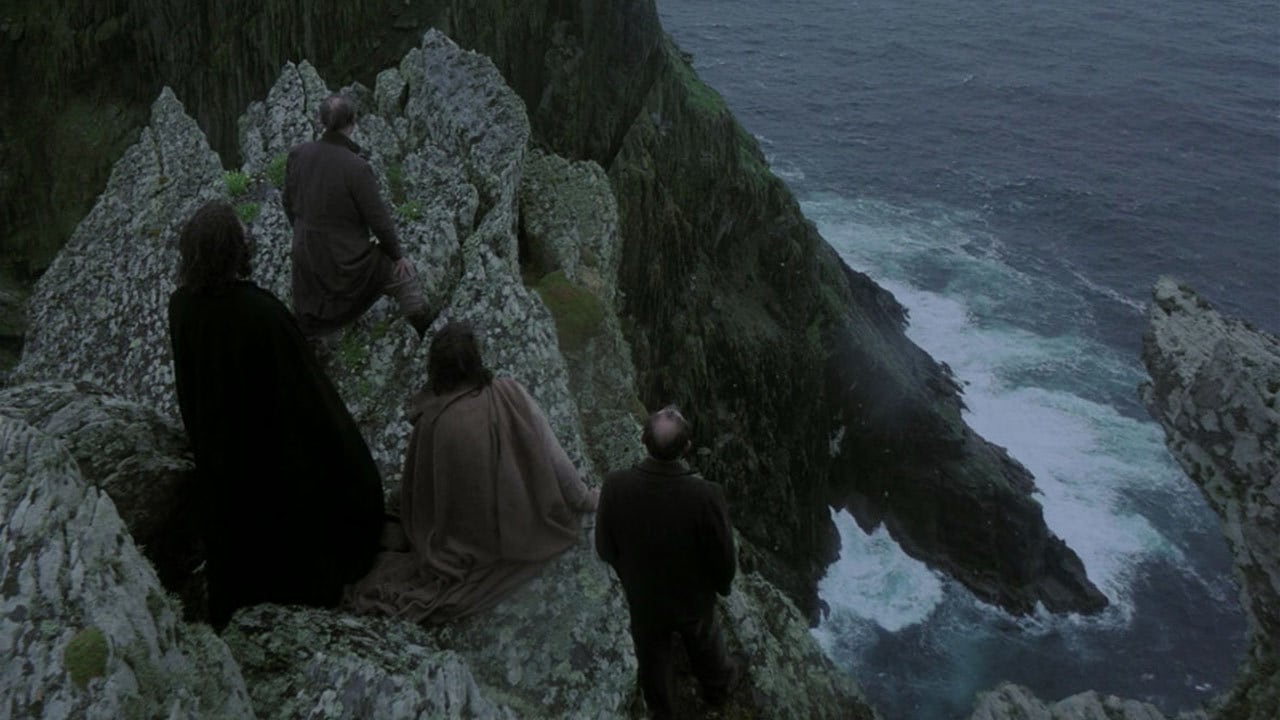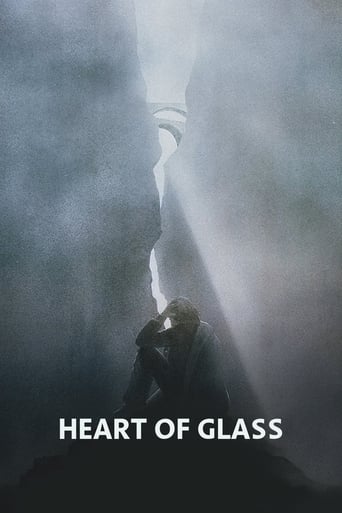Interesteg
What makes it different from others?
ReaderKenka
Let's be realistic.
Smartorhypo
Highly Overrated But Still Good
Mabel Munoz
Just intense enough to provide a much-needed diversion, just lightweight enough to make you forget about it soon after it’s over. It’s not exactly “good,” per se, but it does what it sets out to do in terms of putting us on edge, which makes it … successful?
chaos-rampant
Everything in this film is ritualized, solemn and somnabulent, a state of meditation. It works like a mandala, a symbol that represents in Buddhist lore a sacred space for the concentration of the mind.This goes beyond a stylization, indeed in a manner that defies our knowledge of Herzog, a man of the impromptu and the adventurous, here I discern a certain ceremonial importance. That is, if the film is important, it's because it derives power from the congregation, its audience. It's up to us to be devout or flippant, be absorbed or laugh it off. I mean this is a film where prophecies are fulfilled.It starts with a creation myth, almost by necessity born of destruction, and ends with a diluvian suggestion, with one of those unforgettable Herzogian images that haunt with the futility and madness of human struggle in a yawning indifferent universe. There's a quest here to discover the lost recipe of a glasswork masterpiece, the Ruby, to which we can read all manner of existential parables. Individually, as allegory, this is nothing new. Like meditation, the insight is not intellectual, if we approach it that way the film may seem ponderous, rather it flows from living an experience.There's a marvelous scene where we see glassworkers at work, blowing life into vials or glass horses. Herzog gives us a sharp contrast here between the sheer beauty of creation and the mundanity of it, one of the workers putting down his glasswork to take a sip of beer from a glass jug. The owners of the factory, son and disabled old father, don't even have that spontaneity to enjoy, they waste away in decadence and futile ruminations.How the unforgettable finale ties up to this is a guess, does it merely frame or does it mythically abstract.Like Tibetans work tirelessly day and night on mandalas only to destroy them upon completion as a palpable reminder that all things are transient, so is Heart of Glass a kind of vehicle, an artifice that serves a purpose only if we work on it. If we arrive anywhere by the finale, it's because we walked.
Chad Beattie (bgnish_rv)
Being a huge Herzog fan, normally loving all his films for the absurdity, I found this particular film being my least favorite. First of all, the plot is about the sacred ruby glass, in which the only person with the ability to make this infamous ruby glass dies without revealing the secret. You discover the plot within the first ten minutes, and it grows interest in you, but as the movie goes on, you drastically lose interest. As much potential as the plot had, it didn't really expand into all it was worth.To me, the plot didn't play an important role in the film. I was much more fascinated by the cast of the film, being hypnotized by Herzog (I'm still curious as to how Herzog hypnotized them.) It almost became hilarious during points of the movie. I found my mind sometimes wandering off the subtitles to focus on the minor characters in the background.Unlike other Herzog films, I didn't get much out of this one. Although it did have Herzog's favorite Man vs. Nature theme, I just couldn't take it for what it was. Of course, it did have some beautiful shots that could have been perfect if it wasn't for the horrible quality of the 16mm camera used. Not that I'm blaming Herzog for the lack of funds, just making a point.The whole atmosphere of the film was very "lynchian." The dialog, mostly. It was very obvious that David Lynch (Blue Velvet, Eraserhead) got a lot of inspiration from "Heart of Glass." In conclusion, I would ONLY recommend this movie to fans of Herzog (especially his older films: "Aquirre, the Wrath of God", "Even Dwarfs Started Small", etc) for the reason that they will understand it and get more out of it. However, to people who are unfamiliar with Herzog's older films, I would stay away from this one.
MacAindrais
Heart of Glass (1976) Werner Herzog may well be one of my most cherished humans on the planet. If he were giving a lecture on the idiosyncrasies of his films, I would like to be there. If he was sitting on a sidewalk eating chips, I too would like to be there. He is without a doubt one of the cinema's most fascinating minds ever. He is, in my opinion, the King of the New German Wave of the 70s. And he still makes great and exciting movies! One of his most enchanting moments in his long and ambitious career (really, was there any man more ambitious in films than he?), is Heart of Glass, a totally bizarre portrait of a town gone mad. Although the picture for all intensive purposes defies the boundaries of any genre, it has been described as an absurdest drama-dy. That's a pretty suiting classification. If Heart of Glass can be described in one word, it would have to be absurd.The film's protagonist Hias, a prophet of sorts. He can see the future, and seems usually to be depressed with the burden. His village has just lost the proprietor of its livelihood. The foreman of their red Ruby Glass factory, the only man who knew the secret of how to make it, died without ever getting the chance to pass it on. The town now searches in vain for the secret. Without it they grow depressed and begin losing their sanity, particularly the man who owns the glass works factory in his bid to discover the secrets.That's really all that I can disclose about the film. Herzog's film is one based on style and atmosphere, getting at something underneath its story. He famously hypnotized the entire cast for each scene, save for the actor playing Hias and the professional glassblowers. Much of the dialogue was then improvised in a hypnotic state by the actors. Herzog described how an uneducated man in the cast was hypnotized, and then told to read a poem on the wall. The man replied he couldn't' see it without its glasses. Herzog told him to just move forward and he would see it. He then reportedly read off a stunning poem - a work of his own mind, since no poem ever existed on that wall. The hypnosis not only gives the actor's improvisations an peculiarity, but also their manner of delivery. It's bizarre, but totally encompassing.It's moments of comedy are bizarre but joyful. Two men argue about who will die first, then the townspeople find them and argue which one is still alive. Later, the live man takes the dead man to the pub for a dance as a hurdy gurdy man plays.The film starts with a long shot of Hias sitting in the mountain field watching cows in the fog. Herzog then employs footage he shot of clouds in the mountains, taken over the course of days. One shot in particular appears as though a wave of clouds is invading the hills. It's an absolutely breathtaking shot, and one that I've never forgotten, and likely never will.Herzog once famously suggested that he directs landscapes more so than actors. In Heart of Glass he gives ample evidence to his claim. He takes joy in cutting away to seemingly completely unrelated events: a mountain waterfall, close up, as Hias narrates (it is claimed that this shot will have a hypnotic effect, especially if you speak German and do not have to read the subtitles); smoking springs and ancient trees at Yosemite; and a finale that involves a 500 year old monastery on a steep rocky Island off Ireland (Skellig Islands, fascinating place). The imagery and moody accomplishments of Heart of Glass are difficult to describe in words. It's one of the most visually arresting movie's I've ever seen. Herzog shot the film just a few miles from where he was raised in Bavaria. To list all the stunning shots in the film would be a tedious task. Virtually ever outdoors shot triumphs. It's visual poetry is profound.Heart of Glass is one of Herzog's most unabashedly poetic and abstract films. Who else but Herzog would hypnotize his entire cast for artistic ambitions? It's a glorious film that thrives on its own integrity, and the mad visions of its ingenious helmer.
christopher-underwood
This is a beautifully made film and is indeed beautiful to look at. The landscapes, manipulated and natural are awe inspiring and the interiors almost painterly. However, it is undeniably slow. It is also unworldly. We have a peasant making rather odd prophesies and a cast, acting under hypnosis, responding or not as the mood takes them. Certainly a very different cinema experience but a little wayward and unfocused for my liking. I have to say, though, thanks to the wonder of DVDs, this does come with an accompanying conversation with the director. Watching the commentary track is for me a far more engaging and satisfying experience. Enjoyable too! Herzog is simply marvellous in giving full explanations in instances such as the circumstances of the hypnosis and totally uncooperative when the questioning gets a bit close to seeking 'the answer'. I always hate it when an artist is asked to interpret his work (as if there would be any point in it if it can be fully explained another way) and here Herzog slaps down his interviewer on several occasions. Quite right. Well worth watching/listening for an alternative view on the art of film.

